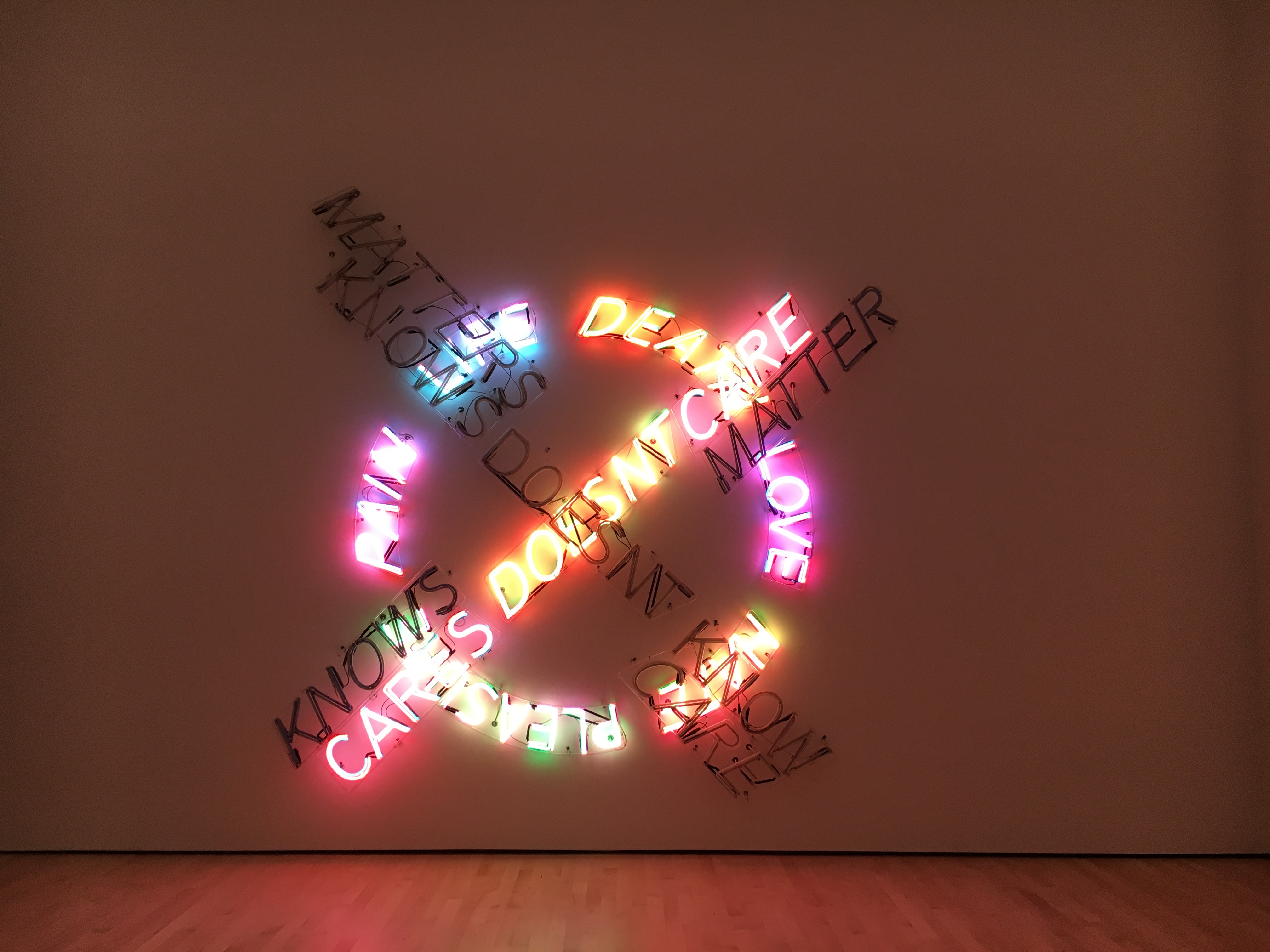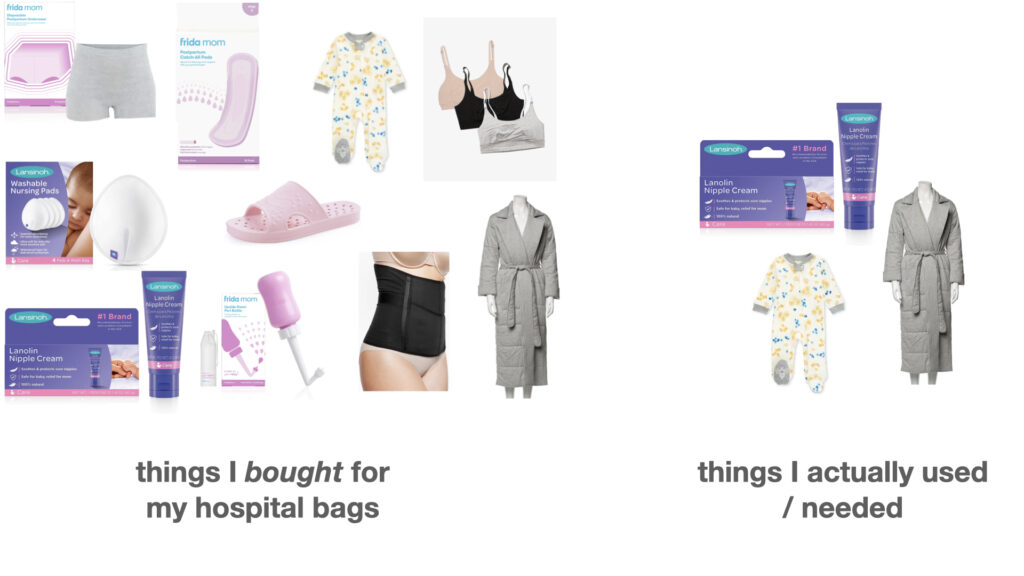
A couple months into parenthood, I felt like I’d taken and flailed in a crash course on newborn care. I did some homework after finding out I was pregnant, of course. Other than hospital classes, I read books, consumed articles and listicles, and watched YouTube videos… Most resources and recommendations seemed straightforward enough. Some were practical and much needed (survival tips for the baby and parents, anyone?). But many were shopping lists. Buy this. Get that. The 12 best pacifiers. If only buying “the best” pacifiers will teach your baby how to sleep, or more importantly, help you decide whether to use a pacifier in the first place. Everything you need in your nursery. Cool ideas, but never mind the American Academy of Pediatrics advice that babies sleep in their parents’ room for at least the first six months. Thirty things to bring to the hospital. Somewhat valuable – except it doesn’t mention calling your hospital to find out exactly what they will provide. Chances are they have most of what you need, or you will be too exhausted from delivery to care (like me).
skip the lists of non-essentials
During the second trimester, I started a spreadsheet of “essential” items to buy, compiled from the numerous “baby essentials,” “hospital essentials,” and “newborn essentials” lists I found. It was a months-long project. Both adding stuff to the list and checking it off gave me a sense of progress and satisfaction. Don’t get me wrong – I see the value in being prepared with the physical stuff. By the time the baby arrives, there are so many things to do, decisions to make, shopping is the last thing we want to worry about. It was fun too. Who doesn’t like to browse baby rompers, socks, and hats. I could spend all day navigating the dozens of websites dedicated to babies or drooling over the most beautifully draped bassinets on social media. The fantasy. The roleplay. The anticipation. And before I knew it, I was buying nursery decorations for a room we didn’t have (we live in a studio).
But the real problem is when I made purchases unintentionally, as a substitute for investing our time and energy in other forms of preparation. I prioritized blindly acquiring stuff over researching if we would even want to use the stuff. I spent hours reading reviews of the colors, styles, and sizing of some stuff – time that could’ve been used more productively or, better yet, to relax and practice self care. I was subconsciously using the “essentials” list as a cheatsheet, the shopping a shortcut, a distraction, a soothing tool (a pacifier, if you will) to conceal my anxiety and overwhelm. I might not know how to change diapers properly or burp the baby effectively, but I sure know how to one-click buy and snag a good deal on Black Friday. And that made me feel better, ready even. For a while anyway.
Then the baby came, and I felt utterly unprepared despite all the stuff. Maybe that’s “normal.” Maybe not. Even now, I believe that the only way to be truly ready for a newborn is to have one (read: when it is here). Every baby’s different and each of us is faced with unique challenges and tough calls that only we, as the parents, can attempt to make. For me, every decision turned into a question that bred more questions. I was constantly searching for answers to questions I didn’t know I had. Perhaps that’s just par for the course for new parents. The point is, childbirth and childcare are an extraordinary experience. Extraordinarily hard sometimes. And boxes of baby stuff that others tell us we need to buy were not the answer. I enjoy an adorable baby moment as much as the next mom; but no cutesy pajama could help me determine if my screaming baby is overtired, undertired, sick, uncomfortably hot or cold, or just whining (patent-pending!) and take responsibility for that call. As a matter of fact, half the items in my spreadsheet went unused or even unopened.

my one baby essential
Since there is no shortage of shopping lists out there, I won’t bore you with another one. If I can only share one thing I wish I knew: it is to take advantage of a lactation consultant, and early.
This is only relevant if you’re considering breastfeeding, obviously. What was less obvious to me was that whether to breastfeed involves more than just a decision. I knew it would probably be uncomfortable. I had mentally prepared myself to power through the physical drain that others have warned me about. I knew it required a lot of stuff. I had bought all the products that people recommended: from breast pumps, nursing pillow, nipple cream, gel pads, to nursing tops. What I didn’t know and wasn’t prepared for was what really happens in the first few days. After doing some research and sitting through a three-hour course in my last trimester, I was under the impression that getting the baby to latch would be the hardest part. It wasn’t. B had great instincts there. But it turned out that habits she’d formed in utero (yes, apparently that’s a thing) and my body made breastfeeding a losing battle for the both of us. Unfortunately, I didn’t learn about all this until it was too late.
My hospital had set up a first lactation consultation for two weeks after delivery, per their protocol. I did not have the appropriate expectations for my personal situation going in, nor did I have a professional resource that knew my case to easily turn to when things started going south. Breastfeeding can be challenging in any case, but this compounded the difficulty and ultimately, accelerated a reluctant decision to give up. I don’t regret ending breastfeeding when I did; I made the best call I could for my family given the available information at the time. But I do wish that making a prenatal appointment with a lactation consultant was presented to me as an option. Or better yet, encouraged for a first-time mom. It either would’ve set me up with more realistic expectations, helped me see more success with breastfeeding, or at least spared me some of the unnecessary pains, distress, and feeling of helplessness.
If you plan on at least attempting to breastfeed and you have access to lactation consultants, try to see if you can speak to one before the baby comes. A high-level, general course on breastfeeding might be enough for many women, but it wasn’t for me. And trust me, you do not want to be troubleshooting on Google in real time, between the feedings, diaper changes, and Googling about home remedies for baby eczema. Better prepared than sorry, right?
xo
One response to “my one baby essential (spoiler: buying is not a strategy)”
[…] was my favorite hobby, a part of my routine, a pacifier. I would hit the stores whenever I had the chance, minimal planning involved. I’ve always […]